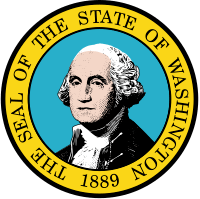Washington Initiative 1631
| Elections in Washington |
|---|
 |
|
General elections
Gubernatorial elections
Attorney General elections Secretary of State elections State Senate elections State House elections State Supreme Court elections Other judicial elections |
|
|
The Washington Carbon Emissions Fee and Revenue Allocation Initiative, also known as Initiative 1631 or the Protect Washington Act[1] is a ballot measure that will appear on ballots in the State of Washington in the November 2018 election.[2] The initiative proposes to reduce pollution by levying a fee on greenhouse gas emissions generated within the state of Washington, and using that revenue to support air quality and energy projects, as well as water quality and forest health initiatives.[2]
Measure Design
If the measure passes, beginning on January 1, 2020, a fee of $15 will be enacted on each metric ton of carbon emitted in the state of Washington. The fee would increase by $2 every year until the state's greenhouse gas emissions target for 2035 is met, and the state's emissions target for 2050 is on track to be met.[2] These goals had previously been set by the Washington State Legislature, which passed a law in 2008 that required the state to reduce its emissions to 1990 levels by 2020, 25% below 1990 levels by 2035, and 80% below 1990 levels by 2050. As of 2018, the state is not on track to achieve those goals.[3]
Background
Environmental advocates in Washington had previously attempted to pass carbon pricing measures. Washington Initiative 732, a "tax swap" proposal to levy a tax on carbon emissions and simultaneously reduce the state's sales tax, had appeared on the ballot in the 2016 election, but failed to pass.[4] Initiative 1631 differs in that it proposes to use revenue from carbon fees to invest in projects to reduce pollution.[5] These include projects related to transportation, energy efficiency, carbon sequestrations in farms and forests, and clean energy. The initiative also proposes to invest over $250 million in climate adaptation in the areas of forestry and water conservation.[6] The particular projects funded will be determined by a board appointed by the governor that will be directed to invest 70% of the revenue in clean energy.[7]
Support
The initiative was drafted by a broad coalition of labor, faith, social justice, health, tribal, and environmental justice groups, such as Front and Centered, a community of color and low-income coalition advocating for a just transition.[2] It is also supported by Carbon Washington, the organization that had put Initiative 732 on the ballot.[8] Other organizations that support the initiative include Stand.earth, The Nature Conservancy, and local chapters of 350.org and the Sierra Club. Elected officials who support this initiative include United States Representative Pramila Jayapal and Washington Governor Jay Inslee.[2]
Opposition
The "No on 1631" campaign is sponsored by the Western States Petroleum Association.[2] The American Fuel and Petrochemical Manufacturers and Cascade Natural Gas have also given money to oppose this measure,[2] as have BP, Royal Dutch Shell, Chevron, and Phillips 66.[9] Oil companies have collectively committed more than twenty million dollars to oppose Initiative 1631.[10][11]
References
- ↑ Funes, Yessenia (5 July 2018). "Why Washington's Latest Carbon Fee Might Just Pass". Earther. Gizmodo Media Group. Gizmodo. Retrieved 30 July 2018.
- 1 2 3 4 5 6 7 "Washington Carbon Emissions Fee and Revenue Allocation Initiative (2018)". Ballotpedia. Retrieved 30 July 2018.
- ↑ St. Onge, Camille. "Washington greenhouse gas limits". Department of Ecology. State of Washington. Retrieved 30 July 2018.
- ↑ "Washington Carbon Emission Tax and Sales Tax Reduction, Initiative 732 (2016)". Ballotpedia. Lucy Burns Institute. Retrieved 30 July 2018.
- ↑ "How Does I-1631 Compare to Other Recent Carbon Pricing Proposals in Washington State?". Carbon Washington. Retrieved 30 July 2018.
- ↑ "Learn More". Yes on 1631. Retrieved 30 July 2018.
- ↑ "Don't call it a tax: Carbon fee heads to ballot". crosscut.com. Retrieved 2018-10-14.
- ↑ "We support the carbon fee initiative I-1631 + news". Carbon Washington. Retrieved 30 July 2018.
- ↑ Yoder, Kate (3 July 2018). "Washington state will likely vote on a carbon price in November. The oil industry's already fighting it". Grist. Retrieved 30 July 2018.
- ↑ Johnson, Peter (25 July 2018). "Big oil is already spending almost $1m to oppose carbon pricing". Seattle Transit Blog. Retrieved 30 July 2018.
- ↑ "Connelly: Bloomberg pledges $1 million to back carbon fee initiative". seattlepi.com. 2018-10-03. Retrieved 2018-10-03.